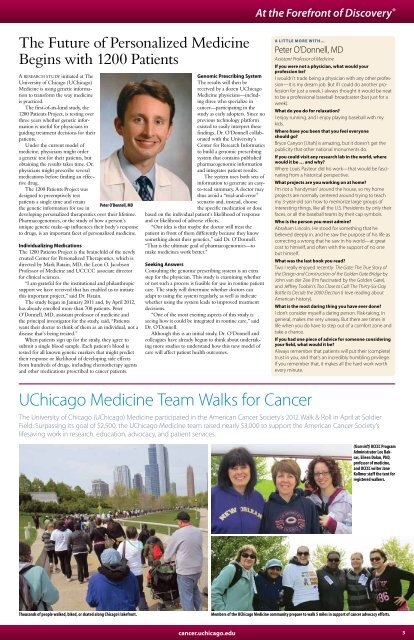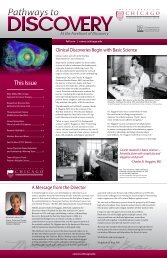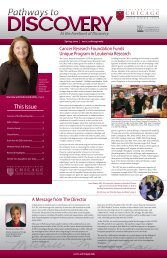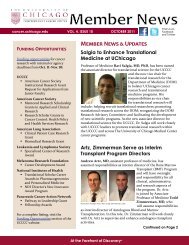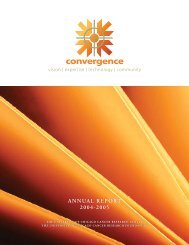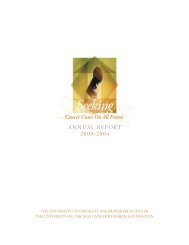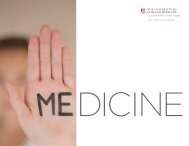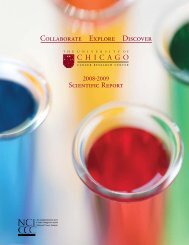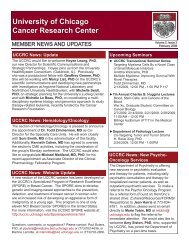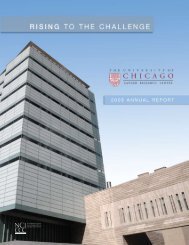Summer 2012 - The University of Chicago Medicine Comprehensive ...
Summer 2012 - The University of Chicago Medicine Comprehensive ...
Summer 2012 - The University of Chicago Medicine Comprehensive ...
- No tags were found...
You also want an ePaper? Increase the reach of your titles
YUMPU automatically turns print PDFs into web optimized ePapers that Google loves.
At the Forefront <strong>of</strong> Discovery ®<strong>The</strong> Future <strong>of</strong> Personalized <strong>Medicine</strong>Begins with 1200 PatientsA research study initiated at <strong>The</strong><strong>University</strong> <strong>of</strong> <strong>Chicago</strong> (U<strong>Chicago</strong>)<strong>Medicine</strong> is using genetic informationto transform the way medicineis practiced.<strong>The</strong> first-<strong>of</strong>-its-kind study, the1200 Patients Project, is testing overthree years whether genetic informationis useful for physicians inguiding treatment decisions for theirpatients.Under the current model <strong>of</strong>medicine, physicians might ordera genetic test for their patients, butobtaining the results takes time. Or,physicians might prescribe severalmedications before finding an effectivedrug.<strong>The</strong> 1200 Patients Project wasdesigned to preemptively testpatients a single time and retainPeter O’Donnell, MDthe genetic information for use indeveloping personalized therapeutics over their lifetime.Pharmacogenomics, or the study <strong>of</strong> how a person’sunique genetic make-up influences their body’s responseto drugs, is an important facet <strong>of</strong> personalized medicine.Individualizing Medications<strong>The</strong> 1200 Patients Project is the brainchild <strong>of</strong> the newlycreated Center for Personalized <strong>The</strong>rapeutics, which isdirected by Mark Ratain, MD, the Leon O. JacobsonPr<strong>of</strong>essor <strong>of</strong> <strong>Medicine</strong> and UCCCC associate directorfor clinical sciences.“I am grateful for the institutional and philanthropicsupport we have received that has enabled us to initiatethis important project,” said Dr. Ratain.<strong>The</strong> study began in January 2011 and, by April <strong>2012</strong>,has already enrolled more than 700 patients. PeterO’Donnell, MD, assistant pr<strong>of</strong>essor <strong>of</strong> medicine andthe principal investigator for the study, said, “Patientswant their doctor to think <strong>of</strong> them as an individual, not adisease that’s being treated.”When patients sign up for the study, they agree tosubmit a single blood sample. Each patient’s blood istested for all known genetic markers that might predicttheir response or likelihood <strong>of</strong> developing side effectsfrom hundreds <strong>of</strong> drugs, including chemotherapy agentsand other medications prescribed to cancer patients.Genomic Prescribing System<strong>The</strong> results will then bereceived by a dozen U<strong>Chicago</strong><strong>Medicine</strong> physicians—includingthree who specialize incancer—participating in thestudy as early adopters. Since noprevious technology platformexisted to easily interpret thesefindings, Dr. O’Donnell collaboratedwith the <strong>University</strong>’sCenter for Research Informaticsto build a genomic prescribingsystem that contains publishedpharmacogenomic informationand integrates patient results.<strong>The</strong> system uses both sets <strong>of</strong>information to generate an easyto-readsummary. A doctor maythus avoid a “trial-and-error”scenario and, instead, choosethe specific medication or dosebased on the individual patient’s likelihood <strong>of</strong> responseand or likelihood <strong>of</strong> adverse effects.“Our idea is that maybe the doctor will treat thepatient in front <strong>of</strong> them differently because they knowsomething about their genetics,” said Dr. O’Donnell.“That is the ultimate goal <strong>of</strong> pharmacogenomics––tomake medicines work better.”Seeking AnswersConsulting the genomic prescribing system is an extrastep for the physician. This study is examining whetheror not such a process is feasible for use in routine patientcare. <strong>The</strong> study will determine whether doctors canadapt to using the system regularly, as well as indicatewhether using the system leads to improved treatmentdecisions.“One <strong>of</strong> the most exciting aspects <strong>of</strong> this study isseeing how it could be integrated in routine care,” saidDr. O’Donnell.Although this is an initial study, Dr. O’Donnell andcolleagues have already begun to think about undertakingmore studies to understand how this new model <strong>of</strong>care will affect patient health outcomes.A Little More With…Peter O’Donnell, MDAssistant Pr<strong>of</strong>essor <strong>of</strong> <strong>Medicine</strong>If you were not a physician, what would yourpr<strong>of</strong>ession be?I wouldn’t trade being a physician with any other pr<strong>of</strong>ession—itis my dream job. But if I could do another pr<strong>of</strong>essionfor just a week, I always thought it would be neatto be a pr<strong>of</strong>essional baseball broadcaster (but just for aweek).What do you do for relaxation?I enjoy running, and I enjoy playing baseball with mykids.Where have you been that you feel everyoneshould go?Bryce Canyon [Utah] is amazing, but it doesn’t get thepublicity that other national monuments do.If you could visit any research lab in the world, wherewould it be … and why?Where Louis Pasteur did his work—that would be fascinatingfrom a historical perspective.What projects are you working on at home?I’m not a ‘handyman’ around the house, so my homeprojects are normally centered around trying to teachmy 3-year-old son how to memorize large groups <strong>of</strong>interesting things, like all the U.S. Presidents by only theirfaces, or all the baseball teams by their cap symbols.Who is the person you most admire?Abraham Lincoln. He stood for something that hebelieved deeply in, and he saw the purpose <strong>of</strong> his life ascorrecting a wrong that he saw in his world—at greatcost to himself, and <strong>of</strong>ten with the support <strong>of</strong> no onebut himself.What was the last book you read?Two I really enjoyed recently: <strong>The</strong> Gate: <strong>The</strong> True Story <strong>of</strong>the Design and Construction <strong>of</strong> the Golden Gate Bridge byJohn van der Zee (I’m fascinated by the Golden Gate),and Jeffrey Toobin’s Too Close to Call: <strong>The</strong> Thirty-Six-DayBattle to Decide the 2000 Election (I love reading aboutAmerican history).What is the most daring thing you have ever done?I don’t consider myself a daring person. Risk-taking, ingeneral, makes me very uneasy. But there are times inlife when you do have to step out <strong>of</strong> a comfort zone andtake a chance.If you had one piece <strong>of</strong> advice for someone consideringyour field, what would it be?Always remember that patients will put their (complete)trust in you, and that’s an incredibly humbling privilege.If you remember that, it makes all the hard work worthevery minute.U<strong>Chicago</strong> <strong>Medicine</strong> Team Walks for Cancer<strong>The</strong> <strong>University</strong> <strong>of</strong> <strong>Chicago</strong> (U<strong>Chicago</strong>) <strong>Medicine</strong> participated in the American Cancer Society’s <strong>2012</strong> Walk & Roll in April at SoldierField. Surpassing its goal <strong>of</strong> $2,500, the U<strong>Chicago</strong> <strong>Medicine</strong> team raised nearly $3,000 to support the American Cancer Society’slifesaving work in research, education, advocacy, and patient services.(from left) UCCCC ProgramAdministrator Lee Baksas,Eileen Dolan, PhD,pr<strong>of</strong>essor <strong>of</strong> medicine,and UCCCC writer JaneKollmer staff the tent forregistered walkers.Thousands <strong>of</strong> people walked, biked, or skated along <strong>Chicago</strong>’s lakefront.Members <strong>of</strong> the U<strong>Chicago</strong> <strong>Medicine</strong> community prepare to walk 5 miles in support <strong>of</strong> cancer advocacy efforts.cancer.uchicago.edu 3


